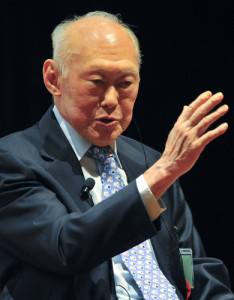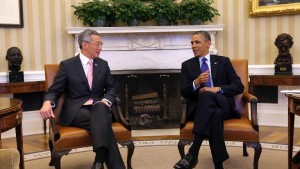Lee Kuan Yew, who founded modern Singapore and was both feared for his authoritarian tactics and admired for turning the city-state into one of the world’s richest nations, died Monday…
The country’s first and longest-serving prime minister, Lee guided Singapore through a traumatic split with Malaysia in 1965 and helped transform what was then a sleepy port city into a global trade and finance center.
Although he could have remained in office for much longer, he stepped aside and handed over leadership of the ruling party, and the country, to a younger generation in 1990.
(The Associated Press, March 23, 2015)
 Between the 1960s and 1990s, long before China became the “awakening dragon,” the talk of the global economy was of the “four Asian tigers,” namely, Hong Kong, South Korea, Taiwan, and Singapore.
Between the 1960s and 1990s, long before China became the “awakening dragon,” the talk of the global economy was of the “four Asian tigers,” namely, Hong Kong, South Korea, Taiwan, and Singapore.
But the Cambridge-educated Lee articulated such a cogent and pragmatic philosophy for national development – characterized by the very visible hand of authoritarian governance guiding free enterprise – that Singapore was easily the most dynamic and envied of the four.
In fact, so much so that the father of China’s economic awakening, Deng Xiaoping, expressly decreed that China’s national development shall emulate Singapore’s:
Singapore’s social order is rather good. Its leaders exercise strict management. We should learn from their experience, and we should do a better job than they do.
(New York Times, August 9, 1992)
Therefore, Lee’s greatest legacy may not be what he did for Singapore, but what he did for China. And could have done for Russia – if only Putin were more interested in developing its economy than in building his ego and lining his pocket.
 What I find most impressive about him is that (a) unlike most strongmen of his generation, he had the humility and good sense to cede power of his own volition, and (b) he made it okay for political strongmen to cry long before a political iron lady felt she could even shed a tear.
What I find most impressive about him is that (a) unlike most strongmen of his generation, he had the humility and good sense to cede power of his own volition, and (b) he made it okay for political strongmen to cry long before a political iron lady felt she could even shed a tear.
Granted, it remains debatable whether his were tears of joy or sorrow that day in 1965, when Singapore separated from Malaysia:
The separation was the result of deep political and economic differences between the ruling parties of Singapore and Malaysia, which created communal tensions that resulted in racial riots in July and September 1964. At a press conference announcing the separation, then Singapore Prime Minister Lee Kuan Yew was overcome by emotions and broke down. Singapore’s union with Malaysia had lasted for less than 23 months.
(Turnbull, C. M. (2009). A history of modern Singapore, 1819-2005)
In any event, there’s no denying Lee’s indispensable role in helping Singapore not just survive but thrive as an independent and sovereign nation.
 The irony, however, is that Singapore’s new generation of leaders – headed (perhaps unsurprisingly) by Lee’s own son, Lee Hsien Loong, as prime minister – are now looking to emulate Western democracies.
The irony, however, is that Singapore’s new generation of leaders – headed (perhaps unsurprisingly) by Lee’s own son, Lee Hsien Loong, as prime minister – are now looking to emulate Western democracies.
And why not? After all, the United States has demonstrated – not just for a generation or two, but for more than two centuries – that political freedoms, property rights, competition, and transparency are absolutely necessary for sustainable development.
Indeed, as impressive as China appears today, corruption, which is endemic and systemic, portends it doom. And, as for the Singapore model it has emulated, the Economist duly notes in its current issue that:
Growth has become dependent on high levels of immigration, angering natives who feel the influx is suppressing their wages and making it impossible to get a seat on the tube… The Singapore model may prove unsustainable even in Singapore.
Which is why the efforts underway to modify Lee’s model suggest that, far from being a “paragon of development,” Singapore really was never more than a “Pyongyang with broadband.”
Lee died early this morning. He was 91.
Farewell, Minister Mentor.